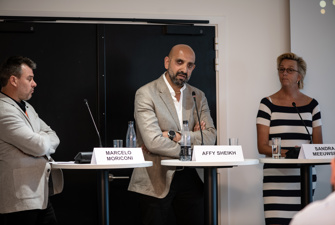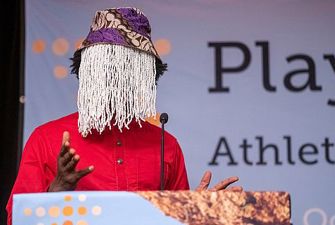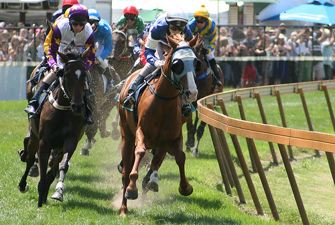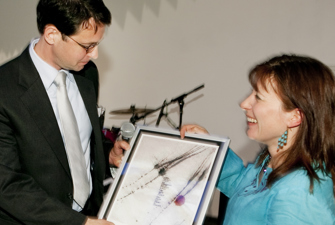Rising popularity of cricket in Europe has led to major match-fixing problems
Cricket is a growing sport in Europe and matches from new, small leagues are livestreamed all over the world. On the Indian subcontinent there is massive demand for betting on cricket, and match-fixers have been quick to capitalise on this new opportunity, reports Steve Menary.
How do you grow a sport without attracting the attention of match-fixers? This is a question that some European cricket federations have asked themselves since they began broadcasting their own matches on the internet and fans from far-away countries started betting on these matches.
Cricket is not a traditional sport in most of Europe but is growing due to a combination of dedicated organisers and immigrants from the Indian subcontinent, where the sport is the most popular. In countries like Germany, for example, cricket is the fastest growing sport and there are now more than 10,000 players.
Unfortunately, match-fixers have been quick to capitalise on this development and during the summer of 2020, they set to work looking to corrupt players and manipulate low level cricket games in Germany, Cyprus, Finland and elsewhere to the astonishment of hard-working European administrators.
Cricket matches in Europe are now livestreamed globally
Over the past few years, a number of developments have combined to make cricket more popular in Europe and more accessible to fans outside the European continent.
In 2018, the International Cricket Council (ICC) decided to stimulate development amongst associate members in Europe by creating an international ranking table for the shorter T20 format of the game. These matches now had a new importance that national federations could use to lobby their governments for more funding.
Within a year, bilateral T20 international matches between associate ICC members had leapt by a third. As increasing interest was essential, many federations began streaming these games live via YouTube.
At the same time, the European Cricket Network (ECN) was founded to drive development of club cricket through the European Cricket League (ECL). That also proved a rapid success and interest spread via social media.
The ECN has agreements with FanCode from India’s biggest sports gaming platform, Dream 11, to broadcast games in the Indian subcontinent and the global live sports and on demand streaming service Sports Flick to broadcast to the rest of the world. The 2019 ECL was viewed on live TV and streamed in over 120 countries by 45 broadcasters.
Unregulated data scouts descended on European cricket grounds When the corona pandemic struck last year, many sports were cancelled and betting companies lacked fixtures to offer to their customers. European cricket was quick to recover and pop-up tournaments were staged with 700 games in over 20 countries in 2020.
The plethora of pop-up tournaments in Europe and further afield prompted ICC Anti-Corruption Unit Coordinator of Investigations Steve Richardson to tweet: “Where these pop up matches are the only cricket being played it’s not a question of maybe corruptors get involved, they will, simple. Sometimes some well-known ones.”
Richardson’s reaction was confirmed by the appearance of unregulated data scouts at European cricket matches that were being livestreamed.
The massive unregulated Asian companies that according to research by HS2 had an annual turnover from all types of betting in 2017 of USD 1.5 trillion, offering the opportunity to bet on a livestreamed Cypriot club cricket was a product to offer customers in the Indian subcontinent. But those betting companies did not want to rely on the same livestream as their customers as the basis for offering inplay betting on events during the game.
Inplay betting generally only works when bettors can watch the event on broadcast television or a livestream. A delay of a second or two between an event in a game and betting companies finding this out can allow punters to get a bet on and beat the bookmakers.
To make sure they have the quickest information from a live game, bookmakers rely on data scouts to transmit live information preferably via a live feed from a person at the game. With livestreams typically lagging 10-15 seconds behind events, the information from the scouts in attendance is very valuable to betting companies as well as bettors taking advantage of the time lag. And that is why data scouts began to descend on European cricket matches being streamed live last summer.
Using data scouts is perfectly legitimate and major sports often have commercial agreements with data companies, which are regulated and can involve barring scouts from other companies from stadiums.
But European cricket games are mostly played on public fields. Organisers cannot check the identity of data scouts who were free to attend. Suspicious organisers at European cricket games last summer began to ask the scouts what they were doing. So the scouts hid, sometimes in cars, or behind bushes, or up trees, usually walking away when challenged but still transmitting that all import game data.
Some European club games attracted a few hundred views or less online, particularly highlights packages, but other livestreams, usually with scouts in attendance were being watched by tens and sometimes hundreds of thousands of people, mainly in the Indian subcontinent.
Match-fixers set to work at low level cricket games
Also watching were the match-fixers, who, as they so often are, were ahead of the organisers. The fixers knew these games were being played mainly by amateur players, often originally from the Indian subcontinent, which has a long history of match manipulation.
So the fixers set to work on corrupting players and manipulating low level cricket games.
In Germany, several players are facing a tribunal this spring over allegations they took bribes to fix games. The red flag for the German cricket federation was that streams of some games on Facebook and YouTube attracted around a million views, mainly from the Indian subcontinent. At these German games, scouts could be found sitting in bushes or hiding elsewhereScouts and suspicious onlookers were also reported in other countries, such as Austria, where more than 73,000 people watched one live streamed game last year.
The case of the Limassol Gladiators
Fixers looking to beat the bookies with information relayed live from a ground – known in tennis as courtsiding – can also work with corrupted players, who will indicate to a watching scout that a certain action is about to take place, allowing a bet to be placed at better odds.
In Cyprus, the Limassol Gladiators were subsequently thrown out of a domestic Cypriot competition livestreamed by ECN after being suspected of fixing a ten-over game against Amdocs on July 21, 2020. Amdocs had not won for a year but triumphed in just seven overs with one Gladiators’ player bowling six successive wide balls to the disgust of watching viewers.
“In July, there were lots of intruders,” recalls Muhammad Hussain, chairman of the Cyprus Cricket Association (CCA):
“There were people we had never seen before and we had no idea where these people were coming from. We had a dozen volunteers and we couldn’t cope. We told people in the audience that they cannot use their phones, so some of them hid in fields.”
For games played in August, the CCA brought in private security and all 11 Gladiators players were banned from games in Cyprus pending an ongoing ICC investigation, although some continue to play abroad including one who has played at international associate level.
Attempts to set up fake tournaments
In football, fixers have created tournaments with the sole aim of trying to dupe bookmakers and tried to do the same with cricket in Turkey.
Senol Zobooglu, international coordinator for the Turkey Cricket Federation (TCF), says: “I was approached by some people who were from Pakistan, Afghanistan and India.”
“They all offered to organise a Turkish championship for Turkish cricket clubs which would take 5-7 days and guaranteed 2-3 games for each team and also offered to bring one or two teams from their country to play in the organisation. They said they have sponsors and would support our federation through sponsors.”
“Finally, they requested an invitation under their names including a couple of other people addressed to the Turkish mission in their country so that they could get a visa and come to Turkey to inspect cricket areas and other aspects.”
The TCF asked for full details of the people involved, including their companies, information about previous activities that they had organised in other countries including their social media accounts so these could be verified, and details of the sponsor and what the sponsorship would provide.
“After that point, they stopped communication,” says Zobooglu.
Players are approached on Instagram to fix matches
Jeremy Brey, the Danish national coach until last summer says that the Danish cricket federation was not aware of any problems but European cricket federations followed ICC protocols including taking away mobile phones from officials and players, which prevents anyone involved with the game being in contact with fixers or bettors.
Cricket Switzerland is not recognised by the ICC but took no chances.
“We appointed an anti-corruption officer to ensure anything like this was avoided,” says president Alexander Mackay. “Players had to hand in mobile devices for the duration of a match.”
One Swiss livestreamed game in St Gallen attracted half a million views because this fixture formed part of the Dream11 European Cricket Series.
“For a normal streamed match we don’t get anywhere near [that],” says Mackay.
Dream11 is a fantasy cricket league that also offers financial rewards for users, and the inclusion of European matches prompted serious analysis in the Indian subcontinent of previously unheralded European players.
One Finnish player, Amjad Sherink, found his profile on ESPN and streams of games from the Helsinki suburb of Kerava attracted ever increasing numbers of viewers, with one exceeding 300,000 views.
The scouts were at Finnish games too, relating ball-by-ball coverage back to India on their cell phones. Before long, players reported approaches to fix matches via Instagram.
Last July, police from the Indian city of Jaipur arrested two men after discovering a betting ring allegedly targeting ECN games. Laptops, 10 mobile phones and a million Indian rupees were confiscated.
After the arrests, the ECN issued a statement saying: “It takes time during and after the review of matches to find potential offenders, but we will leave no stone unturned in our endeavours to uncover corruption and uphold cricket’s integrity in Europe. Along with the news today of arrests, further and fresh investigations are already underway from recent matches that have taken place.”
Corona and massive demand for betting in India drives match-fixing
Dream11 was founded in 2008 and has grown rapidly to more than 50 million users in India. Driven by a ban on betting in most of India and increasing access to smartphones, Dream11 offers users a chance to legally gamble on the performances of players from international icons such as Virat Kohli to unknown European players.
The popularity of Dream11 has prompted a plethora of channels on YouTube and Telegram to offer tips for people playing the game, and scouts for these channels are likely to have been at European games.
For Dream11 and those unregulated betting companies targeting customers in India through the livestreamed European cricket games filled a gap in a fixture list decimated by coronavirus and were preyed on by fixers.
As the ICC said in a statement:
“The lack of cricket during the COVID pandemic and ECN being able to run their events led to an opportunity for corrupters to target these events. Livestreaming does provide an opportunity for corrupters to collect information remotely, but this is only one element of the methods used by them.” The pandemic appears to be easing but the games remain in demand. A game in Barcelona in February attracted nearly 190,000 views on YouTube and was, judging by the viewer comments, again the subject of betting in the Indian subcontinent.
For the ICC and the ECN, this poses a problem and education efforts and integrity protocols are being stepped up.
“The ICC Integrity Unit will continue to work in support of the European Cricket Network and all other European associations to disrupt and deter those looking to corrupt cricket being played across Europe,” added the ICC.
The dedicated organisers at the ECN, who declined to comment on this article, refuse to be cowed into hiding a game they are trying so hard to promote and the livestreams will continue.
But while mobile phones can be taken from players and officials before games, the ICC and the ECN have no power over bystanders watching games in public parks. So the scouts will almost certainly be back and so, somewhere across Europe, will the fixers.












